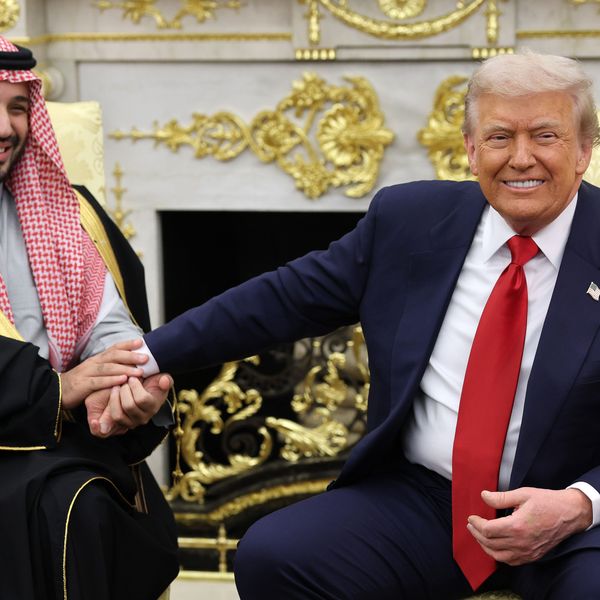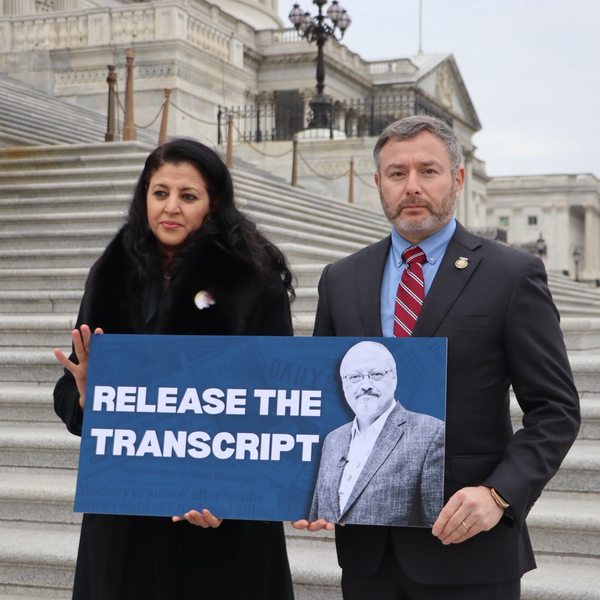Saudi Arabia's Tyrant King Misremembered as Man of Peace
After nearly 20 years as de facto ruler of the Kingdom of Saudi Arabia, King Abdullah ibn-Abdulaziz al-Saud died last night at the age of 90. Abdullah, who took power after his predecessor King Fahd suffered a stroke in 1995, ruled as absolute monarch of a country which protected American interests but also sowed strife and extremism throughout the Middle East and the world.
In a statement last night Senator John McCain eulogized Abdullah as "a vocal advocate for peace, speaking out against violence in the Middle East". John Kerry described the late monarch as "a brave partner in fighting violent extremism" and "a proponent of peace". Not to be outdone, Vice President Joe Biden released a statement mourning Abdullah and announced that he would be personally leading a presidential delegation to offer condolences on his passing.
It's not often that the unelected leader of a country which publicly flogs dissidents and beheads people for sorcery wins such glowing praise from American officials. Even more perplexing, perhaps, have been the fawning obituaries in the mainstream press which have faithfully echoed this characterization of Abdullah as a benign and well-intentioned man of peace.
Tiptoeing around his brutal dictatorship, The Washington Post characterized Abdullah as a "wily king" while The New York Times inexplicably referred to him as "a force of moderation", while also suggesting that evidence of his moderation included having had: "hundreds of militants arrested and some beheaded" (emphasis added).
While granting that Abdullah might be considered a relative moderate within the brazenly anachronistic House of Saud, the fact remains that he presided for two decades over a regime which engaged in wanton human rights abuses, instrumentalized religious chauvinism, and played a hugely counterrevolutionary role in regional politics.
Above all, he was not a leader who shied away from both calling for and engineering more conflict in the Middle East.
Read the full article at The Intercept.
An Urgent Message From Our Co-Founder
Dear Common Dreams reader, The U.S. is on a fast track to authoritarianism like nothing I've ever seen. Meanwhile, corporate news outlets are utterly capitulating to Trump, twisting their coverage to avoid drawing his ire while lining up to stuff cash in his pockets. That's why I believe that Common Dreams is doing the best and most consequential reporting that we've ever done. Our small but mighty team is a progressive reporting powerhouse, covering the news every day that the corporate media never will. Our mission has always been simple: To inform. To inspire. And to ignite change for the common good. Now here's the key piece that I want all our readers to understand: None of this would be possible without your financial support. That's not just some fundraising cliche. It's the absolute and literal truth. We don't accept corporate advertising and never will. We don't have a paywall because we don't think people should be blocked from critical news based on their ability to pay. Everything we do is funded by the donations of readers like you. Will you donate now to help power the nonprofit, independent reporting of Common Dreams? Thank you for being a vital member of our community. Together, we can keep independent journalism alive when it’s needed most. - Craig Brown, Co-founder |
After nearly 20 years as de facto ruler of the Kingdom of Saudi Arabia, King Abdullah ibn-Abdulaziz al-Saud died last night at the age of 90. Abdullah, who took power after his predecessor King Fahd suffered a stroke in 1995, ruled as absolute monarch of a country which protected American interests but also sowed strife and extremism throughout the Middle East and the world.
In a statement last night Senator John McCain eulogized Abdullah as "a vocal advocate for peace, speaking out against violence in the Middle East". John Kerry described the late monarch as "a brave partner in fighting violent extremism" and "a proponent of peace". Not to be outdone, Vice President Joe Biden released a statement mourning Abdullah and announced that he would be personally leading a presidential delegation to offer condolences on his passing.
It's not often that the unelected leader of a country which publicly flogs dissidents and beheads people for sorcery wins such glowing praise from American officials. Even more perplexing, perhaps, have been the fawning obituaries in the mainstream press which have faithfully echoed this characterization of Abdullah as a benign and well-intentioned man of peace.
Tiptoeing around his brutal dictatorship, The Washington Post characterized Abdullah as a "wily king" while The New York Times inexplicably referred to him as "a force of moderation", while also suggesting that evidence of his moderation included having had: "hundreds of militants arrested and some beheaded" (emphasis added).
While granting that Abdullah might be considered a relative moderate within the brazenly anachronistic House of Saud, the fact remains that he presided for two decades over a regime which engaged in wanton human rights abuses, instrumentalized religious chauvinism, and played a hugely counterrevolutionary role in regional politics.
Above all, he was not a leader who shied away from both calling for and engineering more conflict in the Middle East.
Read the full article at The Intercept.
After nearly 20 years as de facto ruler of the Kingdom of Saudi Arabia, King Abdullah ibn-Abdulaziz al-Saud died last night at the age of 90. Abdullah, who took power after his predecessor King Fahd suffered a stroke in 1995, ruled as absolute monarch of a country which protected American interests but also sowed strife and extremism throughout the Middle East and the world.
In a statement last night Senator John McCain eulogized Abdullah as "a vocal advocate for peace, speaking out against violence in the Middle East". John Kerry described the late monarch as "a brave partner in fighting violent extremism" and "a proponent of peace". Not to be outdone, Vice President Joe Biden released a statement mourning Abdullah and announced that he would be personally leading a presidential delegation to offer condolences on his passing.
It's not often that the unelected leader of a country which publicly flogs dissidents and beheads people for sorcery wins such glowing praise from American officials. Even more perplexing, perhaps, have been the fawning obituaries in the mainstream press which have faithfully echoed this characterization of Abdullah as a benign and well-intentioned man of peace.
Tiptoeing around his brutal dictatorship, The Washington Post characterized Abdullah as a "wily king" while The New York Times inexplicably referred to him as "a force of moderation", while also suggesting that evidence of his moderation included having had: "hundreds of militants arrested and some beheaded" (emphasis added).
While granting that Abdullah might be considered a relative moderate within the brazenly anachronistic House of Saud, the fact remains that he presided for two decades over a regime which engaged in wanton human rights abuses, instrumentalized religious chauvinism, and played a hugely counterrevolutionary role in regional politics.
Above all, he was not a leader who shied away from both calling for and engineering more conflict in the Middle East.
Read the full article at The Intercept.

